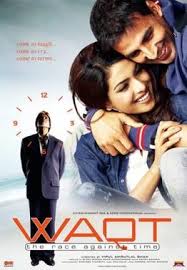With a mix of heartfelt drama and lighthearted comedy, this 2005 family-oriented drama stars Amitabh Bachchan, Akshay Kumar, and Priyanka Chopra, bringing forward the themes of love, responsibility, and the unbreakable bond between a father and son. Set in the bustling city of Mumbai, it navigates the tensions between generational expectations and personal growth. Through the story of an affluent family facing an unexpected challenge, the film strikes an emotional chord, balancing the lightheartedness of Bollywood comedy with deeper reflections on life’s fragility.
The narrative revolves around Ishwarchand Thakur, played by Amitabh, a wealthy businessman who has always provided a life of luxury and security for his son, Aditya, portrayed by Akshay. Aditya, however, is used to an easy life, enjoying its comforts without understanding the value of hard work. The story gains momentum when Ishwarchand decides to teach his son an important life lesson, forcing Aditya to confront reality and take responsibility for his future. This decision challenges Aditya’s carefree outlook and tests the father-son relationship. The plot dives into both the hardships and joys of family relationships, exposing the hidden dynamics between parents and children as Aditya begins to understand the depth of his father’s love through this harsh but valuable lesson.
One of the strongest aspects of the film is its performances, especially from Amitabh and Akshay, whose on-screen chemistry is engaging and heartfelt. Amitabh, with his seasoned and powerful presence, brings a sense of wisdom and depth to the character of Ishwarchand, a man whose tough decisions stem from a place of love and responsibility. Akshay, on the other hand, portrays Aditya with a mix of youthful exuberance and naïveté, eventually showing his character’s transformation from a carefree son to a responsible adult. Akshay’s comedic timing adds a humorous element to the character, making his journey feel both genuine and relatable. Priyanka plays Aditya’s supportive wife, Pooja, with grace and warmth, acting as a balancing force between the father and son, and her chemistry with Akshay adds an extra layer of emotional depth to the narrative. Each performance adds to the film’s warmth and authenticity, making the family dynamics feel relatable.
Director Vipul Amrutlal Shah crafts a family drama that balances emotional weight with moments of levity. His direction is sensitive to the nuances of each character, bringing out the contrasts in personalities and capturing the emotional turmoil without going overboard. Shah’s decision to tackle the subject of time and responsibility is ambitious, and he manages to maintain a fine balance between humor and drama. The pacing of the story allows each emotional beat to sink in, giving viewers time to connect with the characters and their personal struggles. The subtle shifts in mood, handled adeptly by Shah, enable the film to move seamlessly from comedic sequences to more somber and introspective moments.
Cinematography by Santosh Thundiyil plays a vital role in establishing the emotional undertones of the film. From the opulent settings of Ishwarchand’s mansion to the hustle and bustle of Mumbai’s cityscape, the visuals are rich and polished, adding to the story’s grandeur and the contrast in Aditya’s life before and after his father’s challenge. Thundiyil captures both the intimacy of family moments and the expansiveness of the world that Aditya must navigate. The lighting, especially in scenes of personal revelation, accentuates the emotions at play, adding a visual narrative that complements the story.
The music, composed by Anu Malik, aligns well with the emotional currents of the story, providing both lively and melancholic tunes that reflect the different phases of Aditya’s journey. Songs like “Subah Hogi” and “Chhup Jaa” add to the mood without overshadowing the plot. The background score is subtle yet effective, enhancing the emotional moments and adding a layer of tenderness to the father-son relationship. The soundtrack serves as an emotional guide, steering the viewers through scenes of joy, sorrow, and introspection with melodic transitions that blend well with the storyline.
One notable aspect of the film is its thematic exploration of time—both in the context of a ticking clock for personal growth and in the understanding of parental love and sacrifice. The film beautifully captures the urgency and delicacy with which time shapes relationships and the choices we make. Through Ishwarchand’s decision to create a “race against time” for his son, the story reflects on the pressing need to value every moment and understand the weight of responsibility before it’s too late. This theme is carefully interwoven into the film’s fabric, giving it a philosophical depth that resonates with audiences, especially those who have experienced similar familial bonds.
The movie’s costume design and set decor also deserve mention. The Thakur family’s wardrobe reflects their affluent lifestyle, with Ishwarchand’s dignified outfits highlighting his stature and sense of authority, while Aditya’s more relaxed attire initially showcases his carefree nature. As the story progresses, a subtle shift in Aditya’s wardrobe mirrors his character’s evolution, symbolizing his acceptance of responsibility and growth.
Overall, the film is a heartwarming and thought-provoking journey that underscores the importance of family, love, and responsibility. While the plot may lean towards melodrama at times, the well-rounded performances and the relatable theme of generational conflict make it a memorable watch. For those who enjoy family dramas with a moral edge, this movie offers both entertainment and reflection. Its emotional moments and powerful performances make it a compelling watch, especially for fans of Amitabh and Akshay. This movie stands as a reminder of the bonds that define us and the race against time that every family faces in learning, growing, and loving together.







